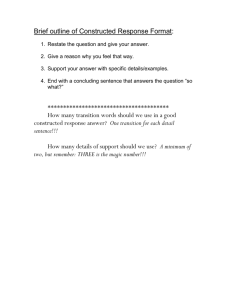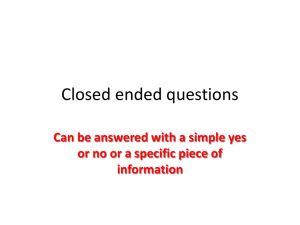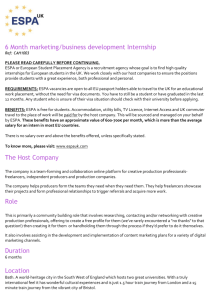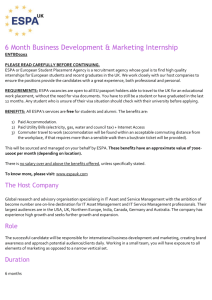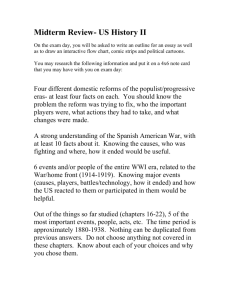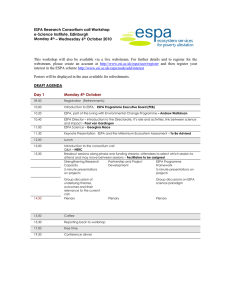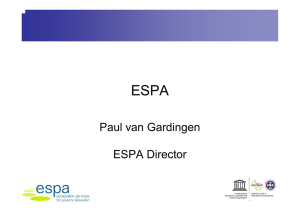NJ ASK Parent Workshop March 26, 2009 Leslie Lopez
advertisement
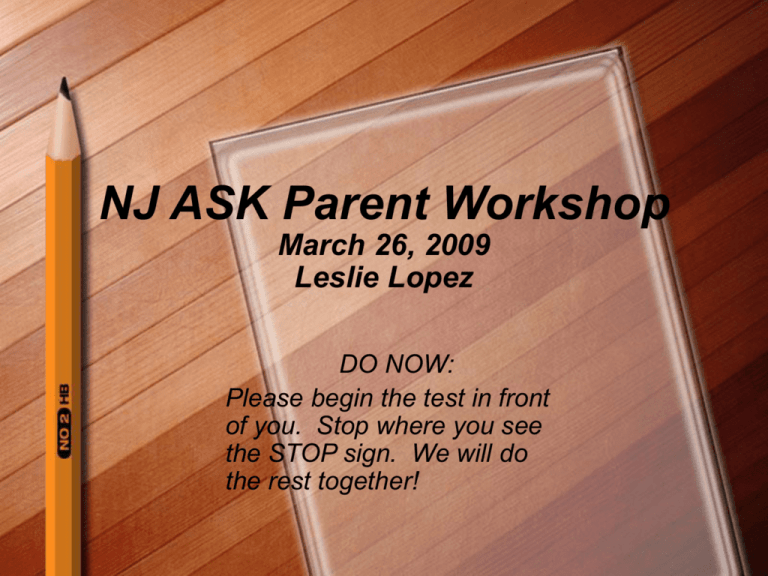
NJ ASK Parent Workshop March 26, 2009 Leslie Lopez DO NOW: Please begin the test in front of you. Stop where you see the STOP sign. We will do the rest together! NJ ASK Testing Dates 2009 Grade 3 - 4 Days total – May 4th-7th (2 days LA, 2 days math - 1 more day this year) Grade 4 - 5 days total – May 4th-8th (2 days LA, 2 days math, 1 day science) Grade 5 -4 days total – May 11th - 14th (2 days LA, 2 days math) Reading Tasks Narrative Text: literature that tells a story Everyday Text: text that people encounter in their everyday lives Alignment to Content Standards Working with Text Extrapolating Information Paraphrasing/Vocabulary Recognition of purpose for reading Recognition of central idea or theme Recognition of supporting details Text organization Analyzing Text Making judgments, drawing conclusions Forming opinions Literary elements and textual conventions Prediction of meanings Questioning, Clarifying, Predicting Reading Strategies: Multiple Choice Read the questions first Underline important words in the story Cross out wrong answer choices using process of elimination Bubble in the correct answer choice How well did you do on the Multiple Choice? Reading Strategies: Open Ended TS:Topic Sentence E1: Evidence One E2: Evidence Two E3: Evidence Three PC: Personal Connection CS: Closing Sentence Transition Words: First, Next, Another, In addition, Furthermore, Lastly, Finally, In conclusion, To wrap it up Now you try it! Format of Test: Reading Reading Tasks 3 tasks Multiple Choice Open Ended 18 (Grade 3) 27 (Grade 4) 31 (Grade 5) 3 (Grade 3) 3 (Grade 4) 3 (Grade 5) Total Points 30 (Grade 3) 39 (Grade 4) 43 (Grade 5) Time 30 minutes 90 minutes total Language Arts Literacy: Writing Tasks Students will have to respond to two writing prompts: Speculative and Explanatory Some, like the poem prompt, will be familiar; others will be newer types of tasks. Students will have 30 minutes to complete each task Note that the picture prompt has been taken out for 2009 Explanatory Prompt: Sample Most people have a special activity or hobby that they enjoy. Some people collect things while others like to read or play games. What activity do you like to do? Write a composition describing what you enjoy doing. Explain why that activity is special to you. 12 Explanatory Prompt: Sample (Students first listen to and read the Shel Silverstein poem “Moon-Catchin’ Net”) Has there ever been something you wanted very much that you may or may not have been able to get? Write about what you wanted. Include the following: What did you want to have and why did you want this? If you got it, explain how it happened and why you were successful. If you didn’t get it, explain why not. Explain how you might be successful in getting it in the future. 13 Speculative Prompt: Sample When the school bell rang, Katie and Pablo grabbed their books and raced out of the classroom. They had been looking forward to this afternoon all week long. Today they were going to go on an adventure. Write a story about the adventure Katie and Pablo had after they left school. 14 14 Writing Task Strategy Planning: BME (5 minutes) Writing:Include STACK PEAS (20 minutes) Check: Use checklist (5 minutes) 30 minutes total Let’s give it a try! Writing Task Rubric NJ ASK 3-5: Math Format of the Test NJASK 3-5 – 44 test items in total 35 Multiple Choice – Each multiple choice item is worth 1 point – Total multiple choice points ~ 35 points 6 Short Constructed Response (NEW this year!) – Only non-calculator section – Each “SCR” worth 1 point - 6 points total 3 Open Ended (Extended Constructed Response) – Problems worth 3 points each – Total of 9 points – Total points for all of math - 50 points Points by Standard Grades 3-4 Number Sense– 20 Geometry & Measurement - 11 Patterns & Algebra - 11 Data Analysis, Probability, Discrete Math - 8 Grade 5 Number Sense– 14 Geometry & Measurement- 12 Patterns & Algebra - 12 Data Analysis, Probability, Discrete Testing the Standards In the standards, whatever is in the grade before is tested in all the following grades – Everything for grade 3 standard can be tested in grade 4 – There is a balance of strands – Importance placed on geometry, patterns, data, and probability Sample Multiple Choice Questions: Third Grade 4th Grade Multiple Choice Sample Grade 5 Sample Multiple Choice Questions Short Constructed Response Examples Item: A lunch menu has 3 beverage selections: water, juice, and milk. The menu also offers 2 sandwich selections: turkey and peanut butter. How many different meals of one beverage and one sandwich are possible? (answer: 6) Item: A bag contains 5 red marbles, 8 blue marbles, and 7 green marbles. Arturo reaches into the bag and removes one marble. What is the probability that marble is red? (correct answers: .25, ¼, 5/20, or 25%) Short Constructed Response Questions Standard to be assessed 4.1.4 B.4 “Use an efficient and accurate paper-and-pencil procedure for computation with whole numbers – addition of three digit numbers.” This standard cannot be assessed with a calculator active item because the standard requires the use of paper-and-pencil to perform the correct computation. Also, students could use the multiple choice answers to find the answer without knowing how to do the computation! Other reasons… Other than paper-and-pencil computations there are other reasons why items are put in as “short constructed response” questions: If the multiple choice answers would be a distraction (and a likely possible wrong choice) So that students can show answers in the format they are most used to. Open Ended Questions (Extended Constructed Response) The Open Ended items require students to construct their own written or graphical responses and explain their responses. It is expected that students will take approximately 10 minutes to answer each question. How will these be scored? Short Constructed Response: One Point Each – Answers are right or wrong – Student work to get the answer will NOT be assessed. Extended Constructed Response (Open Ended) – Scored on a 3 point scale - partial credit is awarded – Students can receive up to 2 points for a proper execution of strategy with a small computational mistake Using the Manipulatives In grades 3 & 4, students will get a set of punch-out shapes & ruler 5th Grade - set of triangles, ruler, protractor Teachers give students a chance to practice using these manipulatives Qualities of Good Student Work They answer the question. The answer is accurate. They answer all parts. They label parts of their work to match parts of the problem. They use the example at the beginning as a model They explain clearly. Their explanations are complete. They don’t assume the reader can read their minds. Strategies for Improving Open Ended Scores Give open-ended questions often and for everything! Teach students that they need to answer all parts of the question (each bullet point, if applicable). Encourage students to use numbers, pictures, words, charts, anything and everything they can. They can’t include too much. Have them work together to improve responses. Train students on how to score these types of questions. Scoring Open-Ended Items A general scoring guide was created to score these items This guide is used in the classroom to score open-ended questions that teachers create or find. Students should be familiar with and practice using this rubric. 3 Point Response The response shows complete understanding of the problem's essential mathematical concepts The student executes procedures completely and gives relevant responses to all parts of the task. The response contains few minor errors, if any. The response contains a clear, effective explanation detailing how the problem was solved so that the reader does not need to infer how and why decisions were made. 2 Point Response The response shows nearly complete understanding of the problem's essential mathematical concepts. The student executes nearly all procedures and gives relevant responses to most parts of the task. The response may have minor errors. The explanation detailing how the problem was solved may not be clear, causing the reader to make some inferences. 1 Point Response The response shows limited understanding of the problem's essential mathematical concepts. The response and procedures may be incomplete and/or may contain major errors. An incomplete explanation of how the problem was solved may contribute to questions as to how and why decisions were made. 0 Point Response The response shows insufficient understanding of the problem's essential mathematical concepts. The procedures, if any, contain major errors. There may be no explanation of the solution or the reader may not be able to understand the explanation. The reader may not be able to understand how and why decisions were made. Sample Open Ended Question Sample 1 Sample 2 Sample 3 NJ ASK: Science (4th grade only) • • • • • • Each multiple choice is worth one point; Each open ended is worth 3 points. 33 multiple choice questions, 2 open ended questions; 39 total possible points. 60 minutes testing time Life Science- 40% of the test Physical Science- 30% of the test Earth Science- 30% of the test How Constable Prepares Faculty meeting time for test analysis. Grade level work sessions throughout year. Mid-year review of student writing with comparison to State. All teachers use the best instructional practices to embed test-taking strategies. – Some samples of curriculum-embedded instruction include: Reading passages, comprehension questions, journal responses, fiction and non fiction reading, writing rubrics & writing mini lessons Test Preparation lessons with targeted strategy instruction Relaxation Lessons Some resources teachers use: – Test taking link on NJDOE website – Released Test Samples – Math “Quick Review” booklets Additional resources for students struggling to meet target goals: – – – – NJ ASK Academy Homework clubs Extended day programs Study Island Some resources we provide parents: Basic Skills Night, Parent Booklets, Study Island, at-home access to databases, PTO Nights, NJ ASK Parent Workshop Home Preparations Normal Routines Balanced Breakfast Try Your Best Attendance/Arrival Share Relaxation Techniques Be Positive Official State Websites http://www.nj.gov/education/assessment/ – This site has sample tests and general information. Look under NJASK/ESPA sample tests http://www.state.nj.us/education/assessment/e s/sample/espa.htm#form4 http://www.state.nj.us/education/assessment/e s/sample/espa.htm#form5 – These 2 sites have an old ESPA test and sample student responses (ESPA is the old name for NJASK) http://www.state.nj.us/education/njpep/assess ment/index.html – New Jersey Professional Education Port (njpep) More state assessment info Test Prep Websites for Kids) http://rozauer.tripod.com/el em.htm ftp://www.uky.edu/pub/arsi/ openresponsequestions/m athorq.pdf www.studyisland.com http://edweb.tusd.k12.az.us /ekowalcz/math/elementary _web_sites.htm
